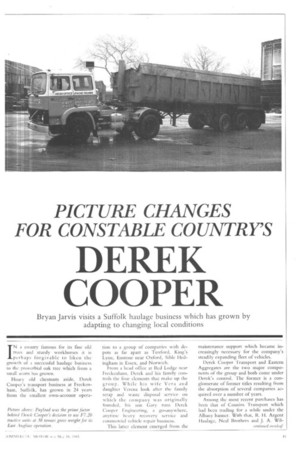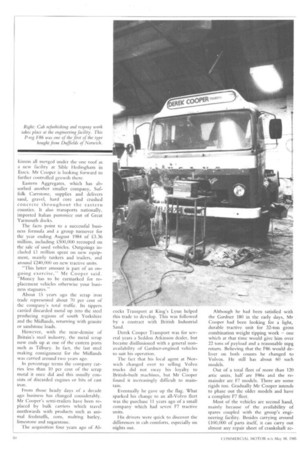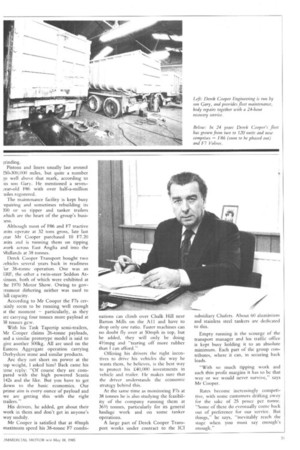DEREK COOPER
Page 51

Page 52

Page 53

If you've noticed an error in this article please click here to report it so we can fix it.
Bryan Jarvis visits a Suffolk haulage business which has grown by adapting to changing local conditions
N a county famous for its fine old trees and sturdy workhorses it is
perhaps forgivable to liken the growth of a successful haulage business to the proverbial oak tree which from a small acorn has grown.
Hoary old chestnuts aside, Derek Cooper's transport business at Freckenham, Suffolk, has grown in 24 years from the smallest own-account opera
Picture above: Payload was the prime factor behind Derek Cooper's decision to use F7.20 fractivr units at 38 tonnes gross weight for its East Anglian operation.
tion to a group of companies with depots as far apart as Tuxford, King's Lynn, Enstone near Oxford, Sible Hedingham in Essex, and Norwich.
From a head office at Red Lodge near Freckenham, Derek and his family controls the four elements that make up the group. While his wife Vera and daughter Verena look after the family scrap and waste disposal service on which the company was originally founded, his son Gary runs Derek Cooper Engineering, a go-anywhere, anytime heavy recovery service and commercial vehicle repair business.
This latter element emerged from the maintenance support which became increasingly necessary for the company's steadily expanding fleet of vehicles.
Derek Cooper Transport and Eastern Aggregates are the two major components of the group and both come under Derek's control. The former is a conglomerate of former titles resulting from the absorption of several companies acquired over a number of years.
Among the most recent purchases has been that of Cousins Transport which had been trading for a while under the Albany banner. With that, R. H. Argent Haulage, Neal Brothers and j. A. Wil
kinson all merged under the one roof as a new facility at Siblc Hedingham in Essex. Mr Cooper is looking forward to further controlled growth there.
Eastern Aggregates, which has absorbed another smaller company, Suffolk Carrstone, supplies and delivers sand, gravel, hard core and crushed concrete throughout the eastern counties. It also transports nationally, imported Italian purnmice out of Great Yarmouth docks.
The facts point to a successful business formula and a group turnover for the year ending August 1984 of £3.36 million, including £500,000 recouped on the sale of used vehicles. Outgoings included 11 million spent on new equipment, mainly tankers and trailers, and around £240,000 on new tractive units.
"This latter amount is part of an ongoing exercise,Mr Cooper said. "Money has to be earmarked for replacement vehicles otherwise your business stagnates."
About 13 years ago the scrap iron trade represented about 70 per cent of the company's total traffic. Its tippers carried discarded metal up into the steel producing regions of south Yorkshire and the Midlands, returning with granite or sandstone loads.
However, with the near-demise of Britain's steel industry, the metal scrap now ends up at one of the eastern ports such as Tilbury. In fact, the last steel making consignment for the Midlands was carried around two years ago.
In percentage terms the company carries less than 10 per cent of the scrap metal it once did and this usually consists of discarded engines or bits of cast iron.
From those heady days of a decade ago business has changed considerably. Mr Cooper's semi-trailers have been replaced by bulk carriers which travel northwards with products such as animal feedstuff's, corn, making barley, limestone and sugarstone.
The acquisition four years ago of Al cocks Transport at King's Lynn helped this trade to develop. This was followed by a contract with British Industrial. Sand.
Derck Cooper Transport was for several years a Seddon Atkinson dealer, but became disillusioned with a general nonavailability of Gardner-engined vehicles to suit his operation.
The fact that his local agent at Norwich changed over to selling Volvo trucks did not sway his loyalty to British-built rmachines, but Mr Cooper found it increasingly difficult to maintain.
Eventually he gave up the flag. What sparked his change to an all-Volvo fleet was the purchase 11 years ago of a small company which had seven F7 tractive units.
His drivers were quick to discover the differences in cab comforts, especially on nights out. Although he had been satisfied with the Gardner 180 in the early days, Mr Cooper had been looking for a light, durable tractive unit for 32-ton gross combination weight tipping work — one which at that time would give him over 22 tons of payload and a reasonable mpg return. Believing that the F86 would deliver on both counts he changed to Volvos. He still has about 60 such models.
Out of a total fleet of more than 120 artic units, half are Ribs and the remainder are F7 models. There are some rigids too. Gradually Mr Cooper intends to phase out the older models and have a complete F7 fleet.
Most of the vehicles arc second hand, mainly because of the availability of spares coupled with the group's engineering facility. Besides carrying around £100,000 of parts itself, it can carry out almost any repair short of crankshaft re Pistons and liners usually last around ?50-300,000 miles, but quite a number Y;o well above that mark, according to sis son Gary. He mentioned a sevenyear-old F86 with over half-a-million niles registered.
The maintenance facility is kept busy repairing and sometimes rebuilding its 200 or so tipper and tanker trailers xhich are the heart of the group's busiless.
Although most of F86 and F7 tractive mits operate at 32 tons gross, late last year Mr Cooper purchased 10 F7.20 mits and is running them on tipping Nork across East Anglia and into the Midlands at 38 tonnes.
Derek Cooper Transport bought two vehicles several years back in readiness or 38-tonne operation. One was an ERF, the other a twin-steer Seddon Atcinson, both of which were exhibited at :he 1970 Motor Show. Owing to govm-nment dithering neither was used to Full capacity.
According to Mr Cooper the F7s cer:ainly seem to be running well enough at the moment — particularly, as they are carrying four tonnes more payload at 38 tonnes gcw.
With his Task Tapertip semi-trailers, Mr Cooper claims 26-tonne payloads, and a similar prototypc model is said to give another 500kg. All are used on the Eastern Aggregate operation carrying Derbyshire stone and similar products.
Arc they not short on power at the top weight, I asked him? Back came his terse reply: "Of course they are compared with the high powered Scania 142s and the like. But you have to get down to the basic economics. Our prime aim is every ounce of payload and we are getting this with the right trailers."
His drivers, he added, get about their work in them and don't get in anyone's way unduly.
Mr Cooper is satisfied that at 40mph maximum speed his 38-tonne F7 combi nations can climb over Chalk Hill near Barton Mills on the All and have to drop only one ratio. Faster machines can no doubt fly over at 50mph in top, but he added, they will only be doing 41/2mpg and "tearing off more rubber than I can afford."
Offering his drivers the right incentives to drive his vehicles the way he wants them, he believes, is the best way to protect his A:40,000 investments in vehicle and trailer. He makes sure that the driver understands the economic strategy behind this.
At the same time as monitoring F7s at 38 tonnes he is also studying the feasibility of the company running them at 361/2 tonnes, particularly for its general haulage work and on some tanker operations.
A large part of Derek Cooper Transport works under contract to the ICI subsidiary Chafers. About 60 aluminium and stainless steel tankers are dedicated to this Empty running is the scourge of the transport manager and his traffic office is kept busy holding it to an absolute minimum. Each part of the group contributes, where it can, in securing back loads.
"With so much tipping work and such thin profit margins it has to be that way or we would never survive," says Mr Cooper.
Rates become increasingly competitive, with some customers drifting away for the sake of 25 pence per tonne. "Some of these do eventually come back out of preference for our service. But things,' he says, "inevitably reach the stage when you must say enough's enough."




















































































